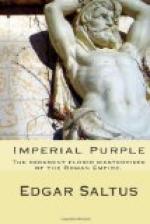In the synoptic gospels similar recommendations appear. Charity is the New Testament told in a word. Christians read and forget it. But Christians are not philosophers. The latter are charitable because they regard evil as a part of the universal order of things, one which it is idle to blame, yet permissible to rectify.
From whatever source such a tenet springs, whether from materialism, stoicism, pyrrhonism, epicureanism, atheism even, is of small matter; it is a tenet which is honorable to the holder. This sceptred misanthrope possessed it, and it was in that his wife was blessed. Years later he died, forgiving her in silence, praising her aloud. Claud, referring to Messalina, shouted through the Forum that the fate which destined him to marry impure women destined him to punish them. Marcus Aurelius said nothing. He did not know what fate destined him to do, but he did know that philosophy taught him to forgive.
It was this philosophy that first perplexed Faustine. She was restless, frivolous, perhaps also a trifle depraved. Frivolous because all women were, depraved because her mother was, and restless because of the curiosity that inflammable imaginations share—in brief, a Roman princess. Her husband differed from the Roman prince. His youth had not been entirely circumspect; he, too, had his curiosities, but they were satisfied, he had found that they stained. When he married he was already the thinker; doubtless, he was tiresome; he could have had little small-talk, and his hours of love-making must have been rare. Presently the affairs of state engrossed him. Faustine was left to herself; save a friend of her own sex, a woman can have no worse companion. She, too, discovered she had curiosities. A gladiator passed that way— then Rome; then Lesbos; then the Lampsacene. “You are my husband’s mistress,” her daughter cried at her. “And you,” the mother answered, “are your brother’s.” Even in the aridity of a chronicle the accusation and rejoinder are dramatic. Fancy what they must have been when mother and daughter hissed them in each other’s teeth. Whether the argument continued is immaterial. Both could have claimed the sanction of religion. In those days a sin was a prayer. Religion was then, as it always had been, purely political. With the individual, with his happiness or aspirations, it concerned itself not at all. It was the prosperity of the empire, its peace and immortality, for which sacrifices were made, and libations offered. The god of Rome was Rome, and religion was patriotism. The antique virtues, courage in war, moderation in peace, and honor at all times, were civic, not personal. It was the state that had a soul, not the individual. Man was ephemeral; it was the nation that endured. It was the permanence of its grandeur that was important, nothing else.




